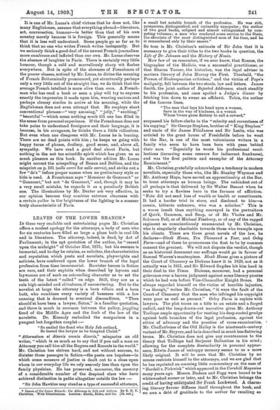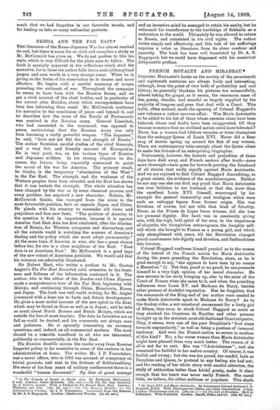LEAVES OF THE LOWER BRANCH.* - IN these very readable
and entertaining pages Mr. Christian offers a modest apology for the attorneys, a body of men who for six centuries have filled so large a place both in real life and in literature. The attorney, indeed, is dead, by Act of Parliament; in the apt quotation of the author, he 'ceased upon the midnight" of October 31st, 1875; but his essence is immortal, and to-day be retains, as solicitor, the characteristics and reputation which poets and novelists, playwrights and satirists, have conferred upon the lower branch of the legal profession from time immemorial. Barrister heroes in fiction are rare, and their exploits when described by laymen and laywonien are of such an astounding character as to set the teeth of the latest "called" on edge. Still, they are as a rule high-minded and chivalrous, if unconvincing. • But to the novelist at large the attorney is a born villain and a born butt, who combines every variety of baseness with a low cunning that is doomed to eventual discomfiture. "Thou should'st have been a lawyer, Satan," is a familiar quotation, and there is much in common between the paltry, juggling fiend of the Middle Ages and the limb of the law of the novelette. Dr. Kenealy embodied the comparison in a Pungent but forgotten couplet :—
" So smiled the fiend who Holy Job enticed,
So leered the lawyer as he tempted Christ."
" Attornalum si dixeris cnnnia dixeris," misquotes an old writer, "which is as much as to say that if you call a man an Attorney you call him all the Rogues and Rascals in the world." Mr. Christian has striven hard, and not without success, to disinter those passages in fiction—the poets are hopeless—in which some measure of justice is dealt out to a class upon whom in our everyday life we rely scarcely less than upon the family physician. He has preserved, moreover, the memory of a considerable number of the despised class who have achieved distinction in paths altogether outside the law :— "Sir John Hawkins may stand as a type of successful attorneys,
• Leaves of the Lower Branch: the Attorney in Life and Letters. By E. B. V. Christian, With Illustrations. London: thnith, Elder, and Co. [db. net.] a small but notable branch of the profession. He was rich, prosperous, distinguished, and eminently unpopular ; the author of two good books, eclipsed and almost extinguished by com- peting volumes; a man who rendered some service to the State, the ahsociate of the most distinguished men of his time, and he
is remembered only by their sneers." - So true is Mr. Christian's estimate of Sir John that it is
necessary to give their titles to the two books in question, the Life of Dr. .Tohnson and the History of Music.
How few of us remember, if we ever knew, that Roscoe, the biographer of the Medicis, was a successful practitioner, or that Sharon Turner, the historian, was the legal adviser in matters literary of John Murray the First. Theobald, "the Parson of Shakespearian criticism," and the victim of Pope's malignity, fell between the two stools, law and letters. James Smith, the joint author of Rejected Addresses, stuck steadily to his profession, and once spoiled a Judge's dinner by fetching him down to swear an affidavit. Tobin, the author of the famous lines,
"The man that lays his hand upon a woman, Save in the way of kindness, is a wretch Whom'twere gross flattery to call a coward," surpassed his fellow-clerks in the "celerity and correctness of his copying." Sir George Stephen, brother of "King Stephen" and uncle of Sir James FitzJames and Sir Leslie, who was articled to the great house of Fresbfields before he went to the Bar, is one of the most voluminous writers in a family who seem to have been born with pens behind their ears. "Especially be wrote his professional recol- lections (incurring some censure for indiscreet frankness),
and was the first pattern and exemplar of the Attorney Reminiscent."
Mr. Christian gratefully acknowledges a tendency in modern novelists, especially those who, like Mr. Stanley Weyman and Mr. Anthony Hope, have served an apprenticeship at the Bar, to treat attorneys as human beings. The unkindest cut of all perhaps is that delivered by Sir Walter Besaut when he seeks to try a flawless hero in the furnace of affliction.
"Fate did not send loss of wealth or health or constituents. It had a harder trial in store, and disclosed to him—a cousin, hitherto unknown, who was a solicitor." This is a worse, insult than anything conveyed in the portraiture of Quirk, Gammon, and Snap, or of Mr. Vholes and Mr. Solomon Pell, or of Michael Finsbury, or of any of the ragged regiment so conscientiously enumerated by Mr. Christian, who is singularly charitable towards those who trample upon his clients. There are three great novels of the law, he declares—Bleak House, Ten Thousand a Year, and Orley Farm—and of these he pronounces the first to be by common consent the greatest. We will not dispute the verdict, though as an historical document our suffrage would go in favour of Samuel Warren's masterpiece. Bleak House gives a picture of
the Court of Chancery as Dickens knew it in 1828, not as it actually was in 1851, and Sir Edward Sugden hit him hard in their duel in the Times. Dickens, moreover, had a personal grievance over a barren judgment against some literary pirates which be had won before Vice-Chancellor Knight Bruce. He always regarded himself as the victim of horrible injustice, "as though]," writes Mr. Christian, "it were the fault of the Court of Chancery that the men who infringed his copyright were poor as well as peccant." Orley Farm is replete with lawyers. The plot turns on a title to an estate and a forged codicil, and the long-drawn-out narrative gives Mr. Anthony Trollope ample opportunity for venting his deep-rooted grudge against both branches of the legal profession, against the ethics of advocacy and the practice of cross-examination. Mr. Chafranbrass of the Old Bailey is the nineteenth-century ! variant of Mr. S buyer, and he is described in much less flattering terms. Mr. Christian does not give any countenance to the
theory that Tialope had Serjeant Ballantine in his mind ; allowing for the complete dissimilarity in personal appear- ance, Edwin James of unhappy memory seems to us a more likely original. It will be seen that Mr. Christian by no means restricts himself to the attorneys, and we are glad that
be has reprinted an amusing little commentary on the case of " Bardell v. Pickwick" which appeared in the Cornhill Magassine many years ago. Messrs. Dodson and Fogg were bound to be whitewashed sooner or later, and to Mr. Christian belongs the credit of having anticipated Sir Frank Lockwood. A charm. jug literary flavour diffuses itself throughout the book, and we owe a debt of gratitude to the author for recalling so
much that we had forgotten in our favourite novels, and for leading us into so many unfamiliar pastures.







































 Previous page
Previous page